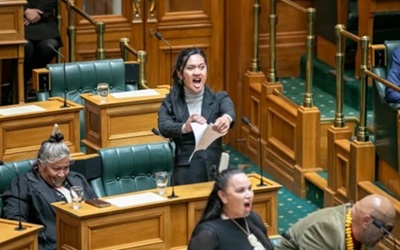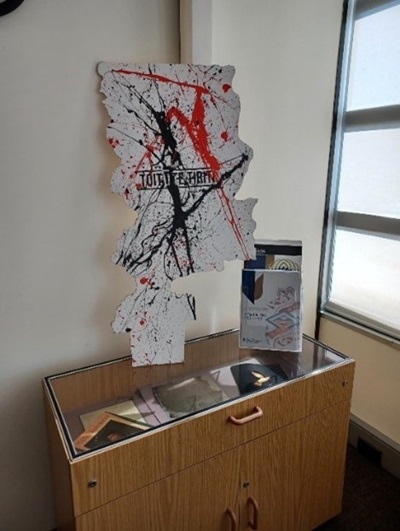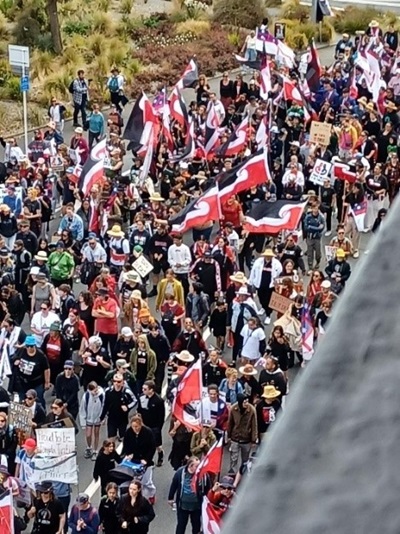2025 | Volume 26 | Issue 1
RACS takes its commitment to Indigenous Health seriously. The Indigenous Health Committee and Māori Health Advisory Group members have been tasked with providing submissions on the review of the Māori and Pacific Admissions Scheme, the Ministry of Health-Hauora Māori strategic plan, the Treaty Principles Bill and the Regulatory Standards Bill.
In November last year the Aotearoa New Zealand government’s proposed Treaty Principles Bill passed through its first reading in Parliament. The proposed bill has been controversial from the beginning and was vehemently opposed by members of opposition parties including most notoriously by the youngest MP of the Māori Party, Hana-Rāwhiti Maipi-Clarke. Her protest resulted in Parliament being shut down and a video of the incident going viral.

Hana-Rawhiti Maipi-Clarke
Why is this bill so contentious?
The proposed bill intends to redefine the principles of Te Tiriti o Waitangi – Treaty of Waitangi, a founding document of Aotearoa New Zealand, that were developed by the government in 1975 to enshrine the Te Tiriti in legislation. The Principles were based on three articles of Te Tiriti and initially included only three principles – partnership, participation and protection or the ‘Three ps’ as they became widely known. Since then, the principles have been debated by various governments, expanded, retracted and attempts made to delete them altogether from legislation. The current government is now reviewing 28 pieces of legislation that have the Treaty principles embedded in them. There is concern the Pae Ora (Healthy Futures) Act 2022, designed to improve public health by promoting health equity among other things, may also be repealed under the current review.
Rationale for the bill
The Hon David Seymour, the leader of coalition party ACT and main proponent of the bill, claims the principles were never formally legislated and there needs to be a public process to debate them.
According to the Justice Department, managing the process: ’Te Tiriti o Waitangi/The Treaty of Waitangi is a founding document of New Zealand and is fundamental to our constitutional arrangements. The Treaty Principles Bill aims to provide an opportunity to build consensus around the place of the Treaty principles in our constitutional and legal arrangements’.1
While this sounds reasonable, the Waitangi Tribunal, the permanent commission of inquiry to hear Māori grievances over breaches of the Treaty released a 200-page report on the bill and recommended it be abandoned2.
At 17 per cent of the population, Māori cannot be said to be a majority voice within Aotearoa New Zealand and RACS does not want to see any ebbing away of the right of Māori to exercise tino rangatiratanga (self determination), guaranteed under Te Tiriti.
A previous National government attempted to fast track the Treaty claims process so that settlements were paid out once and for all with a cap of a billion dollars. This controversial plan, called the Fiscal Envelope, attracted as much opposition as the current bill. The Tribunal was inundated with 2000 additional claims lodged in response to the Fiscal Envelope. Many of these claims are still being heard 16 years later.
By way of comparison the total payout for Te Tiriti claims since they began amounts to $2.6 billion. The legislative reform from 2024 that provided taxation cuts for landlords cost $2.8 billion.
RACS response
Three submissions objecting to the proposed bill were sent from each of the chairs of the Aotearoa New Zealand National Committee (AoNZNC), the Māori Health Advisory Group and the Indigenous Health Committee. The Advisory Group and Indigenous Health Committee had earlier discussed the impact the proposed bill was already having on Māori wellbeing, including the closure of some public health programs designed to address Māori health inequities and a review of MAPAS and Te Kauae Parāoa schemes designed to support Māori and Pasifika students into medical school. The current government abandoning smoke-free legislation also disproportionately impacts Māori.
The former minister of health, Dr Shane Reti, was a product of the MAPAS scheme and says having a representative healthcare workforce is a priority for the government, but there may be other ways of doing it. The minister talked about scholarships and support options.
This is the approach RACS has been taking to increase the representation of Māori in the surgical profession; something that started even before MAPAS and Te Kauae Parāoa came under threat. Its Te Rau Poka surgical academy provides support to Māori surgeons and surgeons in training. This program is in its third year and is funded by the Foundation for Surgery.
Currently in Aotearoa New Zealand there are 30 Māori surgeons and 38 Māori surgical Trainees across five surgical specialties. While there has been a considerable increase in the number of Māori pursuing surgical careers in recent years, Professor Jonathan Koea, RACS Kaiārahi – Māori Trainee Liaison Lead and the country’s only Māori general surgeon when he first completed his training in 1998, says more work needs to be done.
"The recent Health New Zealand workforce report shows by 2033 Aotearoa New Zealand will need significant numbers of new surgeons (26 per cent above the current pipeline for neurosurgery, 17 per cent for cardiothoracic, 16 per cent for general surgery and plastic surgery). Te Rau Poka has Māori Trainees in five branches of surgery keen to return to rohe (their home region) to work, planning and focusing their training towards experience and skill acquisition that will benefit their communities. Te Rau Poka would welcome the chance to work with the government and Health NZ to assist them in meeting the needs of future New Zealanders.”
The AoNZNC submission was hand delivered to Parliament as the website could not cope with the thousands of attempts to submit to the online portal3. It is reported an unprecedented 313,000 submissions were received online, not including those delivered via other means. The submission portal was reopened for an extra week to allow people to complete the process. Copies of the RACS submissions will be available to read on the RACS website.

Additional piece on Hikoi - protest march
Prior to the Introduction of the Bill to Parliament, Te Pāti Māori - The Māori Party organised a Hikoi (protest march). An estimated 35,000 – 50,000 people took part from all over the country. The Hikoi commenced in the Far North of the North Island and deep in the South Island converging at Pōneke Wellington’s aptly named Waitangi Park on the waterfront. The Hikoi then moved around to Kent Terrace where RACS Wellington office is located. Staff had a bird's eye view from the third floor and some of us joined the march to Parliament. Along the way we found a souvenir, a lost placard that is now part of a static display in the Aotearoa New Zealand National Office. Last year, some of the staff visited the display of the actual Treaty/Te Tiriti that resides in the National Library of New Zealand in Pōneke Wellington.

References
1Shane Reti to review 'affirmative action' scheme he graduated from in the 80s | Stuff
2Treaty Principles Bill submissions re-open after website woes | RNZ News
3Treaty Principles Bill submissions re-open after website woes | RNZ News